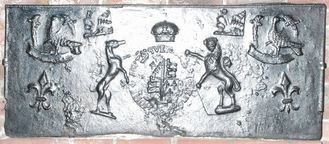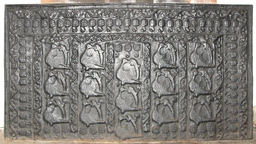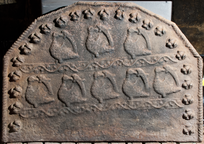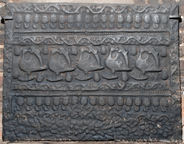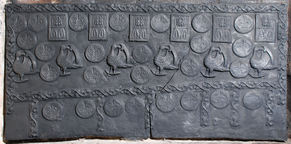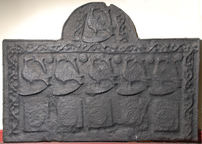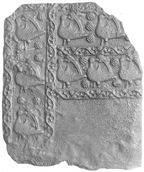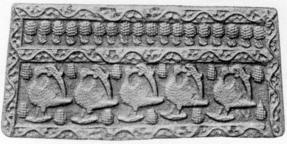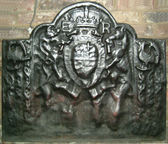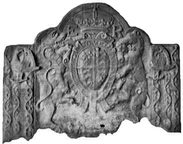-
10
Description: Rectangular; rope edging (top and sides); central Tudor royal shield with encircling garter (motto reversed: HONE SOVT QVEY … PEN), separate greyhound and lion supporters, separate crown; a bird, repeated in each top corner, its wings displayed and inverted and its head facing behind and to the left, standing on a scroll; a fleur de lys repeated in the bottom corners; inside the birds is a repeated stamp, half of one similar to a stamp on a fireback in Hastings Museum.
Notes: The particular form of the Tudor arms and supporters is encountered on other firebacks, as are the distinctive style of fleurs de lys and the birds (probably swans, a Lancastrian icon). The plain scroll upon which the bird is perched suggests that there might have been a painted inscription on it originally and that the stamp had not been made specifically for the decoration of firebacks but was, perhaps, redundant from interior domestic decoration. Formerly at Framfield, East Sussex.
Arms: Tudor royal (prob. Elizabeth I)
- Decoration tags:
- rectangular (shape)
- rope (edging)
- carved stamps
- heraldic
- armorial
- royal
- objects
Manufactured: in the mid- to late-16th century possibly at Pounsley Furnace, Framfield in the Weald area of England.
Current location: The Clergy House, Alfriston, East Sussex, England.
Museum number: 200044 (part of the National Trust museum group)
-
855
Description: Rectangular; twisted rope edging (top and sides); inner border of repeated strips of undulating vine tendril, inside of which are stamped panels of repeated grape bunches, totalling 27 along the upper edge and 13 down each side; inside them is a further border of vine strips within which are five columns of a bird stamp (probably a swan, a Lancastrian badge). each repeated three times, below each of which are three further grape bunch stamps except the middle column, where the grape bunches are above the swans.
Notes: A complex and well executed design incorporating three stamps found on many other firebacks.
- Decoration tags:
- rectangular (shape)
- rope (edging)
- carved stamps
- animals
- plants
Manufactured: in the late-16th century possibly at Pounsley Furnace, Framfield in the Weald area of England.
Current location: in private hands, Butleigh, Somerset, England.
- Attached to series:
- Pounsley series
- Vine strip series
- Swan series
- Furniture stamp firebacks
-
1201
Description: Rectangular with five-facetted arched shape; twisted rope edging (top and sides); small flower-bud stamp repeated 23 times inside the edging; across the middle of the fireback, two approximately parallel lines of lengths of vine strip moulding inclined up to the right; between them, five bird stamps, probably swans (a Lancastrian badge), the front of their left wings 'displayed and inverted', and three more swans above the top line of vine strip moulding.
Notes: The stamps are all seen on other firebacks in the same series. The five-facetted arch is seemingly unique. A very similar fireback with minor differences was lot 2630 at Toovey's auction, Washington, West Sussex, 19 Jun 2015.
Copies of this fireback are known.
- Decoration tags:
- multi-facet arched (shape)
- rope (edging)
- carved stamps
- animals
- objects
Manufactured: in the late-16th century possibly at Pounsley Furnace, Framfield in the Weald area of England.
Current location: in private hands, Chiddingstone, Kent, England.
- Attached to series:
- Pounsley series
- Swan series
- Vine strip series
-
996
Description: Quasi-rectangular shape (42.5mm wider at the bottom); border formed of strips carved with an undulating vine (top and sides); successive rows of repeated stamps: (from top) 18 'hops' or 'grape bunches' in line, horizontal fillet with line of beads below, line of vine strips, 5 birds (probably swans, a Lancastrian badge) in line with 'hops'/'grape bunches' at top and bottom of gaps, line of vine strips, line of beads with horizontal fillet below, 17 'hops'/'grape bunches' in line, and line of vine strips (partially obscured by what appears to be the repeated pressing of finger tips into the casting sand to form an extension at the base).
Notes: One of a series of firebacks incorporating the use of the undulating vine strip, and the 'swan' stamp. Copies of this fireback were advertised in the Wayte & Cheverton (Edenbridge) catalogue in the early-20th century.
Copies of this fireback are known.
- Decoration tags:
- rectangular (shape)
- trailing vine (edging)
- simple stamps
- carved stamps
- heraldic
- animals
- plants
- objects
Manufactured: in the late-16th century possibly at Pounsley Furnace, Framfield in the Weald area of England.
Current location: in private hands, Goudhurst, Kent, England.
- Attached to series:
- Pounsley series
- Vine strip series
- Swan series
- Furniture stamp firebacks
-
96
Description: Rectangular; undulating vine tendril edging (top and upper sides); eight circular, fleur-de-lys butter mould stamps alternating (except at left end) with six rectangular, fleur-de-lys and leaf shortbread or gingerbread stamps, in a line along the top; six bird stamps (wings displayed and inverted) alternating with five pairs of butter mould stamps, as above; continuous line of horizontal vine strips; six descending vine strips, interspaced unevenly with eight butter mould stamps, in pairs except for rightmost two.
Notes: The bird (probably a swan, a Lancastrian badge) and vine strip stamps are encountered on several firebacks. In 1868 this fireback was recorded at Tickeridge, West Hoathly, Sussex.
- Decoration tags:
- rectangular (shape)
- trailing vine (edging)
- simple stamps
- carved stamps
- animals
- plants
- objects
Manufactured: in the mid- to late-16th century possibly at Pounsley Furnace, Framfield in the Weald area of England.
Current location: Nymans, Staplefield Road, Handcross, Slaugham, West Sussex, England.
Museum number: 1206011 (part of the National Trust museum group)
Citation: Stenning, J. C., 1868, 'Notes on East-Grinstead', Sussex Archaeological Collections, 20, pp. 151-2.
-
383
Description: Arched rectangular shape; thin twisted rope edging on top and sides; trailing vine strips frame a row of repeated bird (probably swan) stamps (5) above repeated rose en soleil stamps (5); single bird stamp with two short, slanting vine strips in top arch.
Notes: The rose-en-soleil was the badge of King Edward IV and, thus, a Yorkist symbol, while the swan had been adopted by Henry IV and was, therefore, a Lancastrian symbol.
- Decoration tags:
- rectangular with round arch (shape)
- rope (edging)
- simple stamps
- carved stamps
- heraldic
- objects
Manufactured: in the mid- to late-16th century possibly at Pounsley Furnace, Framfield in the Weald area of England.
Current location: Anne of Cleves House, Southover High Street, Lewes, East Sussex, England.
Museum number: LH000.941 (part of the Sussex Archaeological Society museum group)
Citation: Butterfield, W. R., 1916, 'Old Wealden Firebacks', The Connoisseur, 46, pp. 197-209.
-
854
Description: Sub-rectangular fragment; undulating vine tendril strip repeated twice vertically from left edge with a bird stamp (probably a swan, a Lancastrian badge) repeated three times between, interspersed with a grape cluster stamp repeated seven times; vine tendril stamp repeated twice horizontally at right angles to rightmost vertical strip, three bird stamps between strips and two above, interspersed with seven grape cluster stamps.
Notes: This fragment incorporates common elements from a large series of firebacks.
- Decoration tags:
- rectangular (shape)
- trailing vine (edging)
- carved stamps
- animals
- plants
Manufactured: in the mid- to late-16th century possibly at Pounsley Furnace, Framfield in the Weald area of England.
Current location: Anne of Cleves House, Southover High Street, Lewes, East Sussex, England.
Museum number: LH000.924 (part of the Sussex Archaeological Society museum group)
- Attached to series:
- Pounsley series
- Vine strip series
- Swan series
- Furniture stamp firebacks
-
469
Description: Quasi-rectangular; edging formed of repeated bordered strip with undulating vine with fruit and leaves; horizontal line of two uneavenly repeated vine strips dividing the plate into two compartments, the upper comprising a grape bunch repeated eighteen times, the lower comprising a bird (probably a swan, a Lancastrian badge), its head turned to its left and one visible wing displayed and inverted, repeated five times with a grape bunch repeated twelve times at the ends and between each swan on the top and bottom of the compartment.
Notes: The vine strip, swan and grape bunch stamps feature on many firebacks indicating a common source. Illustration from Lloyd, 1925.
- Decoration tags:
- rectangular (shape)
- trailing vine (edging)
- simple stamps
- carved stamps
- heraldic
- animals
- plants
- objects
Manufactured: in the mid- to late-16th century possibly at Pounsley Furnace, Framfield in the Weald area of England.
Current location: not known.
Citation: Lloyd, N., 1925, 'Domestic Ironwork I', Architectural Review, 58, pp. 58-67.
- Attached to series:
- Pounsley series
- Vine strip series
- Swan series
- Furniture stamp firebacks
-
620
Description: Arched rectangular shape with rounded corners; ovolo within fillet moulding all round; oval Tudor royal shield with garter surrounding, topped with a royal crown; dragon and greyhound supporters; initials split by crown; inscription on a fillet between legs of supporters, behind garter finial; motto on an Ionic plinth at bottom; two rectangular side panels, each with a bird stamp (probably a swan, a Lancastrian badge) above a vine strip stamp repeated three times vertically.
Notes: One of two known variants of the John Harvo fireback incorporating extension panels with vine strips and 'swans'; the positions of the swans vary slightly between the two variants.
Copies of this fireback are known.
Inscription: E R [+ Garter, Harvo and royal mottoes, all illegible]
Arms: Tudor royal - prob. Edward VI
- Decoration tags:
- rectangular with round arch (shape)
- rope (edging)
- simple stamps
- carved stamps
- whole carved pattern
- individual letters
- extension panels
- heraldic
- armorial
- royal
- text
- animals
- objects
Manufactured: in the mid- to late-16th century possibly at Pounsley Furnace, Framfield in the Weald area of England.
Current location: Mark Ripley Forge & Fireplaces, Northbridge Street, Robertsbridge, East Sussex, England.
-
848
Description: Arched rectangular shape with rounded corners; ovolo within fillet moulding all round; oval Tudor royal shield with garter surrounding, topped with a royal crown; dragon and greyhound supporters; initials split by crown; inscription on a fillet between legs of supporters, behind garter finial; motto on an Ionic plinth at bottom; two rectangular side panels, each with a bird stamp (probably a swan, a Lancastrian badge) above a vine strip stamp repeated three times vertically.
Notes: One of two known variants of the John Harvo fireback incorporating extension panels with vine strips and 'swans'; the positions of the swans vary slightly between the two variants. Formerly at the old post office, Ticehurst, Sussex.
Inscription: E R / HONY SOIT QUE MAL Y PAYNCE
Arms: Tudor royal - prob. Edward VI
- Decoration tags:
- rectangular with round arch (shape)
- carved pattern panels
- whole carved pattern
- extension panels
- armorial
- royal
- animals
- objects
Manufactured: in the mid- to late-16th century possibly at Pounsley Furnace, Framfield in the Weald area of England.
Current location: not known.
